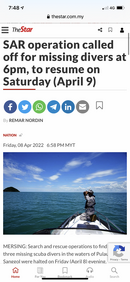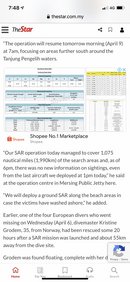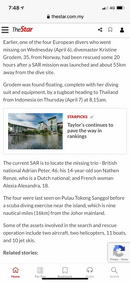First, here's hoping for a good outcome!
So what is the general consensus here in this situation then, that all stay together and possibly become lost forever / dying, or the strongest swimmer, seemingly in this case the instuctor - (and after having somehow secured the others together so they don't drift apart) - make an attempt to reach land and alert someone to the situation?
Me, I am for the latter option, as I have been there / had someone do that. I see that being more a 'duty of care' than all sticking together and simply floating away holding hands hoping your found before your dead.
Oh, as an aside, I am another that fully supports the carrying of a PLB and other safety / rescue devices, especially if diving at all 'remotely' or in so-called third world countries. Better to have and never need, than to need and not







